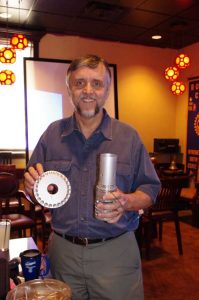
Kyrene Corridor Rotary Club, the south Tempe branch of a widely heralded international organization aimed at improving the world through hands-on projects and fundraisers, got an inside look at an Arizona State University program that brings sustainable technologies to other parts of the globe.
On Oct. 17, Mark Henderson, co-founder of ASU’s Global Resolve Program, told members about the program’s projects to help communities around the world, primarily inGhana,MexicoandArizona.
“Three billion people, nearly half the earth’s population, earn less than $3 a day,”Hendersonsaid. “We’re trying to do something at ASU with Global Resolve to help communities at the base of the pyramid (those who are poverty-stricken).”
Hendersonsaid that, after creating the concepts, ASU students and professors work to develop businesses around those new technologies.
“The first place we visited was a little village inGhanain 2006,” he said. “We arranged a community meeting and the chief there said he needed two things: clean water and a social life, which meant lights at night – there are no lights inAfrica.”
Hendersonsaid the Global Resolve team followed up by partnering with other universities and helping develop sustainable technologies to solve the problems listed by the chief as vital to the community’s future.
“Everything in the village runs off into one pond. It’s not clean water at all and it makes people sick,”Hendersonsaid. “So we collected some money from a local church, just across fromMcClintock Drive, and were able to provide 400 water filters.”
The filters are ceramic pots that use sawdust to treat water from the pond in an extremely efficient manner,Hendersonsaid.
Another technology developed by an ASU student was a low-cost, sustainable light source. The “Twig Light” is a cylinder-shaped metal device that sits in a bowl of water, with burning twigs on top (hence the name).
A thermo-electric generator is placed in the middle of the cylinder, and the difference in temperature between the two sections powers the generator, which in turn powers a lamp of 25 LED lights.
“So, now the kids can do homework at night, without using kerosene fuel,”Hendersonsaid.
After implementing the technologies, the program focuses on developing businesses around those technologies, helping to grow the village’s economy, he said.
Hendersonsaid Global Resolve is continuing to develop new technologies and visit villages through the program.
“We take students every year, mostly toGhana, but we’ve been toKenya,Mexicoand we will be going toIndiastarting this spring,” he said. “We teamed with villages and other universities, so that’s where we are now.”
Mark Henderson is the professor of engineering and associate dean of theBarrettHonorsCollegeat ASU, and teaches at the Polytechnic Campus.
For more information on Global Resolve, visit http://globalresolve.asu.edu/ .
Growth plans
At the club’s Oct. 3 meeting, Membership Services chair Harry Short reviewed the results of a survey that was completed by the group’s 13 members, noting that club growth, while not necessary, would be valuable.
With more members, Short said, the club can accomplish more, do a better job of replacing those who leave, and retain members who might be considering resigning.
He also said that adding new members will help generate new ideas and provide new energy for future programs.
Short’s analysis of the club’s growth showed that at one point in the seven years it has been in existence, membership reached a high of 20. Three new members were added during the past year, with a net gain of three.
At the same session, which included brainstorming ways to encourage new interest in club participation, members listed personal invitation and greater emphasis on involving the media in covering club events.
Discussion will continue at a future meeting.
Kyrene Corridor Rotary Club meets at noon Mondays at Kobe Japanese Steak House, 1125 E. Elliot Road, Tempe.

